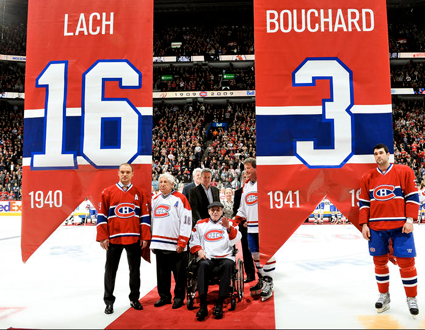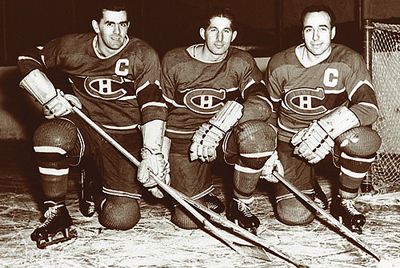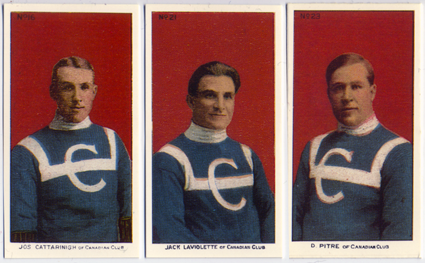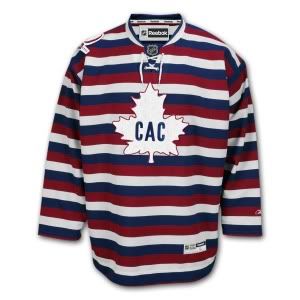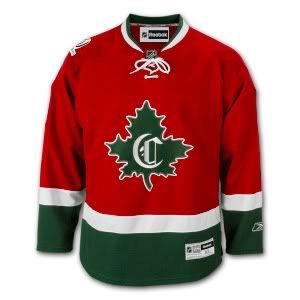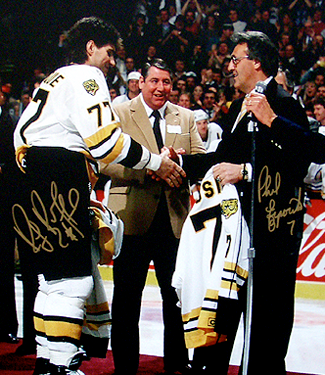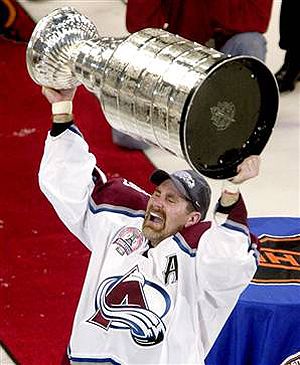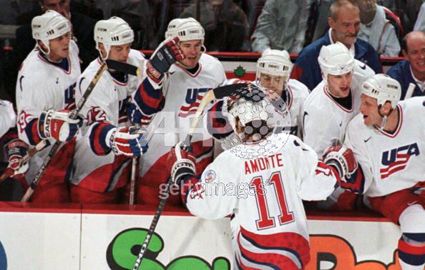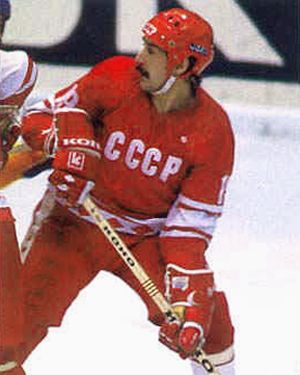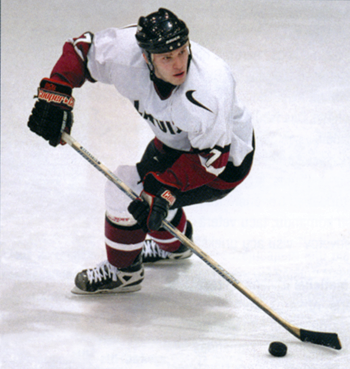First to do this, first to do that, yadda, yadda, yadda. Seriously, every day there's another one to fend off, as we desperately search for something else, anything else, interesting and worthy enough to be that day's topic.
Well, it's a surprisingly slow day in hockey history considering we are in the heart of the NHL season and Gretzky's done it again, for on this date in 1996 Wayne Gretzky became the first player in NHL history to reach the 3,000 point mark, including playoffs.
Playoff points? Who includes playoff points? Well, today we do because it's the best factoid we've got to work with and we just happen to have a 1996-97 Gretzky jersey in the collection that ties into it perfectly. So there you go. Gretzky once again.
Wayne Gretzky started out in the WHA with the Indianapolis Racers, of all clubs, for a couple of weeks, scoring six points in eight games before being dealt to the Edmonton Oilers for the remainder of the season in which he scored another 104 points in 72 games with Edmonton. That year he added another 20 points in 13 playoff games for a grand total of 130 points.
Following that season the Oilers, along with three other surviving WHA teams joined the NHL, where Gretzky would play the remainder of his record shattering career.
He announced his 1979-80 arrival in the NHL by tying Marcel Dionne for the league lead in points with 137, losing out on the Art Ross Trophy on the first tiebreaker of goals scored, as Dionne had 53 goals to Gretzky's 51. The playoffs would see an additional 3 points in 3 games.
Making certain there was not going to be any tiebreakers the following season, Gretzky would win the title with 164 points, 29 more than Dionne, and set the all-time single season mark, eclipsing Phil Esposito's 152 set in 1971, for the first of his seven consecutive scoring titles. 21 playoff points would follow.
Gretzky would lay waste to the opposition in 1981-82 by leading the league in both goals and assists, with an all-time NHL record total of 92 goals, scoring 65 points more than Mike Bossy, for a total of 212, the first player to ever top 200 points in a single season and beating his own year old single season record by 48 points. He would add 12 points in the playoffs in 5 games.
1982-83 would see a reprise of the previous season, with Gretzky topping the charts in both goals and assists, finishing the season with 196 regular season points, beating Peter Stastny by an incredible 72 points. 16 playoff games would see an amazing 38 more points.
A return to the 200 point stratosphere followed in 1983-84 with 205 points and the most goals and assists once more as he outdistanced teammate and defenseman Paul Coffey by an astounding 79 points. 35 more points would follow in the playoffs as Gretzky and the Oilers would capture their first of four Stanley Cups.
Business as usual in 1984-85 saw another 208 point run to Gretzky's fifth consecutive Art Ross Trophy, leading once more in both goals and assists, this time 73 points up on another Oiler teammate, this time Jari Kurri. He would set the single season record for most points in the playoffs with 47 points in just 18 games on the way to another Stanley Cup.
Gretzky would raise the single season scoring mark in 1985-86 by topping his own mark with 215 on the strength of 163 assists, setting an all-time record in that category. Gretzky would finally relinquish the goal scoring title that season, coming in sixth with 52, 16 behind Kurri, who obviously benefitted from Gretzky's record number of assists. Even teammate Glenn Anderson had more goals than Gretzky with 54. An early exit from the playoffs would see an additional 19 points in 10 games.
Despite a "dip" in production, 1986-87 would conclude with his seventh scoring championship, as Gretzky would lead the league in both goals and assists once again. His 183 points were 75 more than Kurri, but would break his run of 200 point seasons at three. A return to the Stanley Cup title saw another 34 points.
Only playing in 64 games would force Gretzky to relinquish his scoring crown, as his 149 points left him 19 back of Mario Lemieux despite leading the league in assists for the ninth consecutive season. The final Stanley Cup of Gretzky's career saw him in peak form with 43 points in 19 games.
1988-89 saw a return to the 50 goal club and his 114 assists would tie him for the league lead with Lemieux as he racked up another 168 points, placing second to Lemieux overall during Gretzky's first season in Los Angeles. 11 playoff games saw the opportunity to add 22 more points.
He would reclaim the Art Ross Trophy in 1989-90 with 142 points and yet another league leading assist total, this time with a mere 13 points over former Oiler teammate Mark Messier. 7 playoff games for the Kings had Gretzky add 10 points.
His 163 points in 1990-91 gave him 32 more than Brett Hull to once more win the scoring title, despite finishing outside the top ten in goals, and his 122 assists topped Adam Oates by 32 as well. 15 playoff points followed.
Lemieux's return to form would cost Gretzky the scoring title in 1991-92, but another 121 points were added to his career totals with Gretzky coming in third overall behind both Lemieux and his Pittsburgh Penguins teammate Kevin Stevens. His league leading 90 assists would give him his 13th consecutive league leading assist total. The playoffs saw the Kings eliminated early and Gretzky was unable to add more than 7 points, his lowest total since the Oilers first season in the NHL when they went three and out.
The following season would see Gretzky limited to 65 points in just 45 games before a return to the top in 1993-94 saw him capture his record setting 10th Art Ross Trophy with 130 points and a league topping 92 assists. Taking the Kings to the Stanley Cup Finals gave Gretzky an additional 24 playoff games to put op another 40 points.
With his season split between Los Angeles and St. Louis, 1995-96 saw Gretzky put up a combined 102 points, the final 100 point season of his career. 13 playoff games with the Blues added 16 more points.
The final three seasons of his career were spent with the New York Rangers, finishing 4th overall in 1996-97, the season he reached the 3,000 point mark during his NHL career, with 97 points, leading the league once more in assists with 72. In the final playoffs of his career, Gretzky added another 20 points in 15 games before the Rangers were ousted. The final NHL playoff totals of Gretzky's career stand at 208 games, 122 goals, 260 assists for 382 points.
The 1997-98 season saw Gretzky put up another 90 points for third in the league. His 67 assists lead the league, clearing showing the change in the style of play in the NHL when just a few seasons earlier 67 assists would have placed a player outside of the top ten.
Gretzky's final season saw him log 70 games and 62 points.
He holds the career records for goals with 894, assists with 1963, points with 2857 in just 1478 games, a 1.93 point per game average.
His NHL totals show 1016 goals and 2223 assists for 3,239 points, and when combined with his season in the WHA, the grand total climbs to 3,369 points, a mark that may live forever.
Today's featured jersey is a Starter 1996-97 New York Rangers Wayne Gretzky home jersey. This jersey features the unique "double tagging" on the back.
Traditionally jerseys of the day carried the manufacturer's logo on only the lower right side, but due to Gretzky's preference to tuck his jersey into his breezers on the right-hand side, which dates back to his youth when playing with older boys his oversized jerseys would interfere with his stick. Not wanting to miss out on having their brand associated with Gretzky and his amazing accomplishments, and the resulting publicity, jersey manufacturers started adding their logo to the left side of Gretzky's jerseys to ensure their proper visibility.
Sure, we could post a hundred videos of Gretzky scoring a bunch of goals or lifting Stanley Cup after Stanley Cup, but why bother? We've all been there and done that. Let's go off the board today and see what the YouTube wheel of fortune brings us...
